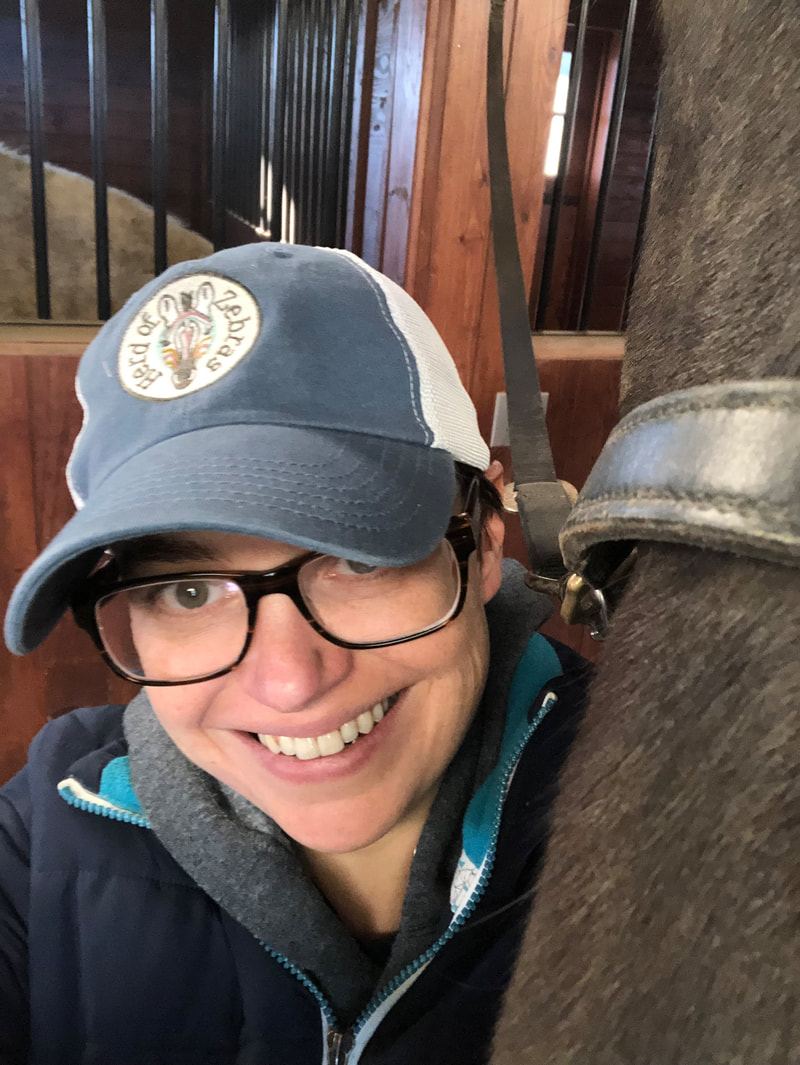My shopping cart
Your cart is currently empty.
Continue Shopping

Hello, Zebras! I’m Jess. I’m a freelance writer, an event rider, and a very gay nerd.
I’ve come a long way in my journey (I’m 37), and even thinking about where to start with this is hard. I’ve been through eating disorders; abusive relationships; struggles with PTSD, depression, and anxiety; coming out as queer.
Instead of going into the dreary details of all of it, I’d like to share with you some of the things that I have learned. And because I just squeak in under the line of millennial and love a listicle, here you go:
No One Can Complete You Except You
Ah yes, codependency, the hallmark of abuse victims everywhere. I see you, thinking that you can find another person to make you feel like a whole, valid human being. I see you, believing that you’re someone else’s missing piece. I hate to tell you this, but: it’s not true. You can be enormously happy with a partner who brings joy to you every day, but you are a whole person on your own. Until you believe that, you can get yourself into some bad situations trying to make an unhealthy relationship work. I have BEEN THERE.
It Doesn’t Matter Who’s Had it Worse--It Matters That We Support Healing
I hear some version of this every single time I’m talking with another person about their struggles: “I shouldn’t complain; other people have had it worse.”
Whatever. Everyone’s story is different, but everyone can suffer. It doesn’t matter if other people are “worse off” than you. What matters is that you are doing the work to heal and supporting others in their journeys too. Don’t let yourself get sucked into, “I’m a self-pitying loser who can’t cope with XYZ because other people have had it worse.” That doesn’t help you or those “other people.”
You Have Choices
When you’re feeling miserable or going through something that feels impossibly difficult, as hard as it is to believe, you do have choices. There are people who can help, even if that help is just listening and validating. I’m so lucky to have good listeners in my life.
Of course, refusing to get help in the form of shooting down every option is also a choice. Sometimes we might feel like we’re getting something from the misery or the unhealthy relationship. But honestly, from my own experience, I think people who insist on staying stuck are afraid. It can be hard to let go of the things we need to let go of (people, habits, addictions) to get better. It’s up to you. I’m glad I chose to get un-stuck.
But Some People Are More Marginalized Than Others
All of that said, accessing help of any kind is absolutely easier for some people than others. People who are in poverty, who don’t have health insurance, who have language or mobility challenges that make it difficult to connect--it’s harder.
Also, some people are institutionally marginalized. We live in a country that still makes accessing what we need to be healthy harder for people of color, people in poverty, people who aren’t straight and cis (identify as the gender they were assigned at birth). So recognize with compassion that if you see people struggling harder than you are to make their lives work, there might be structural reasons for that beyond their control. Ask them what you can do.
Your Job is Not to be Perfect; Your Job is to Grow
I think perfect people are really boring and I’m not interested in being friends with them (except you, my friend who is reading this right now and is obviously perfect). And they’re not perfect anyway, they’re just not willing to show the weird or flawed side of themselves, which means I don’t know what to latch onto. I can’t relate.
You don’t have to already know everything, either. Despite what Canceled Culture says, you don’t have to be perfect and never mess up a pronoun or have an awkward conversation or say something you wish you could take back but it’s too late. It’s really easy to beat ourselves up for that stuff (ask me how I know, as I lie awake at 1:30 in the morning wondering if I really said that).
What you can do instead is commit to working on understanding other people and their experiences so that you don’t hurt others with your words and actions. You can realize that awkward conversations are adorable. You can, perhaps most importantly, work to ensure that you have very good boundaries, neither porous nor impossibly rigid, so that you treat others with respect and insist on the same from them.
You Can’t Shame Yourself into Being a Better Person
Along these lines: look, we all have shame. Anyone who doesn’t is a dangerous sociopath. But beating yourself up over your mistakes or your secret desires or whatever little weirdsies are floating around in your brain isn’t going to help. Are you hurting others? No? Then there’s no need for shame. Yes? Well, see above, and learn what you need to do to grow.
You have to love yourself. How gross is that? I really resent it, but it’s the truth. As my friends in recovery say, the way to develop self esteem is to do esteemable acts. You will not improve via self-loathing, because once you’ve started down that path, it’s never enough. We can always find reasons to hate ourselves, but honestly, it’s not getting us anywhere good.
Start small--spend extra time loving on your horse, call your grandma to say hi, adopt a shelter cat. Whatever you need to do to feel your light getting brighter. Self-hate doesn’t help with that at all.
Have Compassion for Others, but Not at the Expense of Compassion For Yourself
But while we’re doing esteemable acts, let’s not loop ourselves back around to that codependent place. Your job is to take care of you. What do you need to be a happy, settled person? Not in terms of financial or career achievements, but internally?
I need a lot of time to myself. I need to be in mostly quiet places. I need to ride my horse. So if a friend is having people over but I’m tapped out emotionally, I will stay home. My friend may be disappointed, but I have to look out for myself first. Then when I do choose to go out another evening, I don’t feel as run down and am able to engage with my friends much more sincerely. And by the same token, if a friend cancels with me, I thank them for trusting me to understand and wish them a peaceful evening. Just this little adjustment to my life has made a big difference.
Embrace Medication and Therapy if You Need It
Okay y’all, listen. I’ve been through hell and back, and it was a whole heck ton of work. I don’t know where I’d be without my Zoloft and my therapist. My abuser didn’t want me to get therapy, of course, because she knew it would end up the way it did: with me walking away and never looking back. I am so glad I didn’t let her stop me.
Before I went to therapy, I really believed that I was not capable of making healthy connections with other people. I thought I was too flawed to ever have a healthy attachment. And before I started taking medication, even though I never wanted to hurt myself, my brain wouldn’t give me any relief from constant thoughts of suicide. As soon as I started taking it, those thoughts went away and I could focus on getting stronger with therapy and not spinning my wheels. You can pry my Zoloft out of my cold dead hands now. I never plan to stop taking it. Why risk it?
If we need medication, it’s because our brain chemistry isn’t doing what it needs to do, and as the Facebook meme says, if you can’t make your own neurotransmitters, store-bought is fine. All the medications do is ensure that you’re not also fighting against your brain slurping up all the serotonin that you need to function.
To those who are suffering from depression and/or anxiety but don’t want to take medication for it because of the side effects, I would ask you: what are the side effects of not taking the medication? Probably not good.
And therapy, like, I know it sounds indulgent to go talk about yourself for an hour a week, but don’t we all do that anyway when we vent to our friends? A therapist is a trained professional who isn’t going to shame you, interrupt you to change the subject, make it about them, tell you to just get over it, make you feel like a loser, whatever. The therapist has skills to help you learn how to cope better, that’s all.
Okay, I think that’s enough of my opinions. If anyone needs help and doesn’t know where to look, please reach out to me, I’m easy to find on Instagram (@ravenclawson81) or email jess.clawson@gmail.com and I’ll help you find what you need.